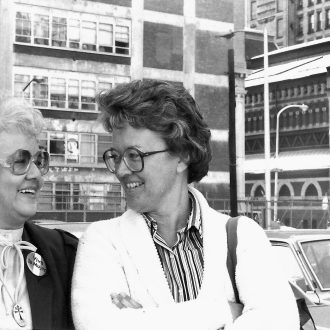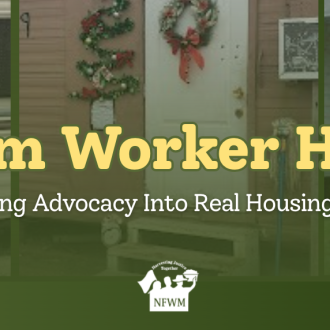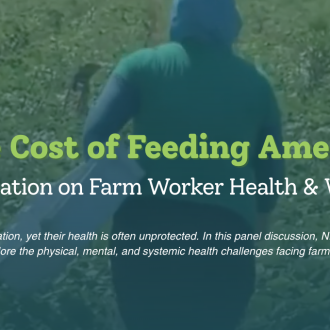Compiled by the National Farm Worker Ministry
OPENING PRAYER
Leader: Let us begin by recalling the words of Cesar Chavez: “Every time we sit at a table at night or in the morning to enjoy the fruits and grain and vegetables from our good earth, remember that they come from the work of men and women and children who have been exploited for generations…”
Lord Jesus, too often we don’t pay attention, we don’t stop to think that, even in this day and age, injustice remains an invisible ingredient in much of the food that we eat. Shake us awake, Lord, open our eyes to see our power and obligation as consumers to help put things right. Justice demands it. Love demands it.
SONG: WHATSOEVER YOU DO (or other appropriate song)
BEATITUDES OF THE FARM WORKER
Reader 1: I was hungry, and you said “We only deal with problems in the city, not in the rural areas.”
Reader 2: I was imprisoned, and you said you were sorry but there was nothing you could do.
Reader 3: I was naked, and you looked the other way as you passed Me by in your expensive three-piece suit.
Reader 4: I was sick with pesticide poisoning, and you never thought of the human cost in the vegetables on your table.
Reader 5: I was homeless, a migrant sleeping in My old car with My family of six, and you refused to see how your board members could make a difference.
Reader 6: I was grieving over My children, who never had a chance to get an education, and you said “Too bad” and continued with your business as usual.
Reader 7: Whatsoever you do to the least of My people, make no mistake, you do it to Me.
POSSIBLE READINGS
Matthew 10:34-39, Matthew 19:16-26, Luke 4:16-21, Mark 12:41-44, Luke 18:1-8
“Gandhi, King, Chavez, Mother Teresa, the nameless saints–they are all irritants, challenging the careful, comfortable ways we have organized our lives. Yet we love them. Why do we love them? It is only partly because of who they are. They give flesh to what they believe and thereby awaken a spirit deep within us. By their words and deeds they call forth that part of us that yearns to give life, to love mercy and to do justice. By living their lives the way they do they reach for what is deepest and best in each of us–pulling, organizing, putting our love for justice to work in practical ways that serve the poor. We respect and love ourselves more as we put into practice what we believe in our hearts; and we love, with a universal love, those persons who led us on that better way…” (The Rev. Wayne “Chris” Hartmire, founding director, NFWM)
“Most middle class church people will squirm out of taking responsibility for justice work if they have no direct stake in it. If not too much is asked, it’s all right. But when we contemplate deeper involvement we quickly think about possibly offending people we regularly see at church, at home, at work, or about losing our job, going to jail, getting embroiled in a long fight and not being able to get loose. Middle class people need poor people pulling them into action on behalf of justice and wholeness. Works of love and justice renew our always disintegrating integrity. People who were blessed and renewed in their work with the farm workers are an important reminder of the rewards of the Kingdom. These experiences enhance our understanding of the Beatitudes.” (Pat Hoffman, Ministry of the Dispossessed, Ventura, CA)
POSSIBLE SERMON / REFLECTION THEMES
1. God’s bias toward the poor and weak and the implications of this for our response to the farm workers’ struggle.
2. The difficulty of avoiding the issue of farm worker justice–we all eat, we are all consumers.
3. Jesus and the prophets as the challengers of the comfortable.
4. Justice as one way of practicing love in an imperfect world.
5. Why do we get tired of a justice struggle like the farm workers’ cause? How do some people stay with it?
6. Relating to the poorest of the poor: service as compared to servanthood, charity as compared to justice work, giving from one’s surplus time/money/energy as compared to sharing.
7. The farm workers and nonviolence.
SONG: HERE I AM, LORD (or other appropriate song)
CLOSING PRAYER (written by His Eminence Roger Cardinal Mahoney)
Father, God of goodness, you give us the land to provide us with food. Hear the prayers of your people and give all who work on that land a full measure of human dignity and justice. May we bring the spirit of Christ to all our efforts, and may these efforts yield a rich harvest of justice, peace, and love. We ask this through Christ our Lord.
All Respond: Amen.
CHARGE TO THOSE PRESENT
Leader: Listen to the words of Dorothy Day (Loaves and Fishes by Dorothy Day, Harper & Row, 1963):
“Young people say, ‘What good can one person do? What is the sense of our small effort?’ They cannot see that we must lay one brick at a time, take one step at a time; we can be responsible only for the one action of the present moment. but we can beg for an increase of love in our hearts that will vitalize and transform all our individual actions, and know that God will take them and multiply them, as Jesus multiplied the loaves and fishes.
“The greatest challenge of the day is: how to bring about a revolution of the heart, a revolution which has to start with each one of us? When we begin to take the lowest place, to wash the feet of others, to love our brothers [and sisters] with that burning love, that passion, which led to the Cross, then we can truly say, ‘Now I have begun.'”
Let us begin with one action.
[Contact the National Farm Worker Ministry for current actions requested by farm worker organizations around the country. Choose which action(s) would be most appropriate for your group. Some actions can be done in a gathering, e.g., letter-writing, and some, e.g., making a phone call, can be done after participants have returned home from the service. All are valuable ways of aiding farm workers in their struggle for justice.]



